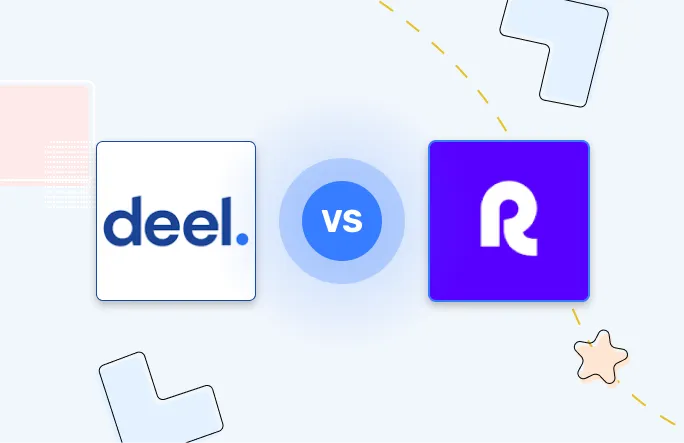Why Companies Choose Between Deel and Remote for Hiring in India

When expanding their operations into India, international companies often face the challenge of choosing between different Employer of Record (EOR) providers. Deel and Remote are two of the most popular platforms, both offering robust solutions for managing remote teams, payroll, compliance, and hiring in India. However, there are distinct differences between the two services that influence businesses’ decisions. In this blog, we will explore the Deel vs Remote pros and cons and why companies may choose one over the other when hiring employees in India.
Key Factors That Influence the Choice Between Deel and Remote for Hiring in India
Several factors come into play when businesses decide between Deel and Remote for hiring in India. These factors include pricing, compliance needs, platform features, and the level of customer support required. Below are the main considerations that influence companies’ decisions when choosing between Deel and Remote.
1. Service Flexibility and Customization
For businesses with complex hiring needs, the ability to customize services can be a critical factor in choosing an EOR provider. Deel and Remote offer different levels of flexibility in this regard.
Deel vs Remote pros and cons when it comes to service flexibility:
- Deel: Deel offers more flexibility and customization options. Businesses can tailor compensation packages, benefits, and contract terms to suit the unique needs of their workforce in India. This makes Deel a good fit for companies that require a more personalized approach to managing their employees.
- Remote: Remote’s service offering is simpler and more standardized. While it provides all the necessary EOR functions, it offers fewer customization options compared to Deel. This is beneficial for companies that prioritize simplicity and want to avoid the complexity of customized benefits and contracts.
If your business needs a more tailored approach, Deel’s flexibility will likely be more appealing. However, for businesses seeking a streamlined, no-frills solution, Remote could be the better choice.
2. Pricing and Cost Structure
Cost is always a significant consideration when choosing an EOR provider. Deel and Remote have different pricing models, which can affect the overall cost structure of hiring in India.
Deel vs Remote pros and cons when it comes to pricing:
- Deel: Deel’s pricing tends to be higher due to the more customizable services it offers. The platform provides premium features such as legal support, extensive benefits packages, and more flexibility in managing employee compensation, which can justify the higher cost for businesses with more complex needs.
- Remote: Remote typically offers a more affordable pricing model, which is ideal for businesses that don’t need as many customized services. Remote’s pricing structure is simpler and more transparent, which makes it an appealing choice for companies looking for cost-effective EOR solutions.
For businesses with a limited budget or those looking for simplicity, Remote’s cost-effectiveness is a major advantage. On the other hand, Deel’s pricing is better suited for companies that require more features and flexibility.
3. Compliance and Legal Support
Compliance with local labor laws is critical when hiring employees in India, and both Deel and Remote help businesses meet these obligations. However, there are differences in the level of support they offer for compliance issues.
Deel vs Remote pros and cons regarding compliance and legal support:
- Deel: Deel offers more comprehensive legal support, including guidance on Indian labor laws, contract management, and the complexities of local regulations. Deel’s legal team helps businesses navigate the constantly changing regulatory environment in India, ensuring full compliance.
- Remote: Remote provides core compliance services, such as ensuring adherence to statutory benefits like Provident Fund (PF), Employee State Insurance (ESI), and Gratuity. However, Remote doesn’t provide as much legal consulting or hands-on support for navigating India’s complex labor laws compared to Deel.
If your business requires more detailed legal support and ongoing compliance guidance, Deel is likely the better option. Remote is suitable for businesses that need basic compliance but don’t require extensive legal assistance.
4. Platform Usability and Features
The user experience and available platform features are essential for companies that need to efficiently manage their remote teams. Deel and Remote both offer robust platforms, but the features and overall user interface vary.
Deel vs Remote pros and cons when it comes to platform features:
- Deel: Deel offers a more feature-rich platform, with tools for contract management, onboarding, document storage, and customized reporting. The platform is designed to provide businesses with comprehensive control over their employee data and HR processes.
- Remote: Remote focuses on simplicity and ease of use, with a streamlined interface that covers payroll, compliance, and benefits management. While it offers fewer features than Deel, it excels in providing a clean, user-friendly experience for businesses looking for a straightforward solution.
If your business requires a platform with a wide array of tools and greater control over HR processes, Deel’s platform will be the better choice. However, for companies that prioritize simplicity and ease of use, Remote is an ideal option.
5. Customer Support and Service
The level of customer support provided by Deel and Remote can significantly impact how businesses manage their teams and handle any issues that arise.
Deel vs Remote pros and cons regarding customer support:
- Deel: Deel offers 24/7 customer support with dedicated teams for payroll, compliance, and legal matters. Their support is highly regarded, especially for companies that need assistance with complex employment issues in India.
- Remote: Remote also offers customer support, but it tends to be less extensive than Deel’s. While the support team is responsive and effective for straightforward queries, businesses requiring more detailed assistance may find Deel’s service more comprehensive.
For businesses that anticipate needing ongoing support, particularly with legal and compliance matters, Deel’s customer service is more robust. Remote’s support is sufficient for basic queries but may not be as in-depth.
6. Global Expansion and Future Scaling
As companies expand beyond India into other regions, the ability of their EOR provider to scale with them is crucial. Both Deel and Remote offer services in multiple countries, but there are some distinctions in their global reach.
Deel vs Remote pros and cons when it comes to global expansion:
- Deel: Deel operates in over 150 countries and is well-suited for businesses that plan to expand into new markets rapidly. With Deel, businesses can seamlessly manage global teams in different countries with a consistent experience and compliance support.
- Remote: Remote offers services in fewer countries than Deel but still covers a wide range of markets. While Remote may not be as extensive as Deel, it provides reliable EOR services for businesses that are scaling in select regions.
For businesses with ambitions for global expansion, Deel’s broader reach and scalability are advantages. However, if India is the primary focus and expansion plans are more limited, Remote provides a reliable and cost-effective solution.
Conclusion
When comparing Deel and Remote, the choice ultimately depends on your company’s specific needs, budget, and growth plans. Deel offers more flexibility, comprehensive features, and robust customer support, making it ideal for businesses with complex requirements and a global expansion strategy. On the other hand, Remote is a simpler, more affordable solution that is perfect for businesses seeking a straightforward EOR service with a focus on core payroll and compliance functions.
By understanding the Deel vs Remote pros and cons, businesses can make an informed decision that aligns with their objectives for hiring and managing teams in India.


